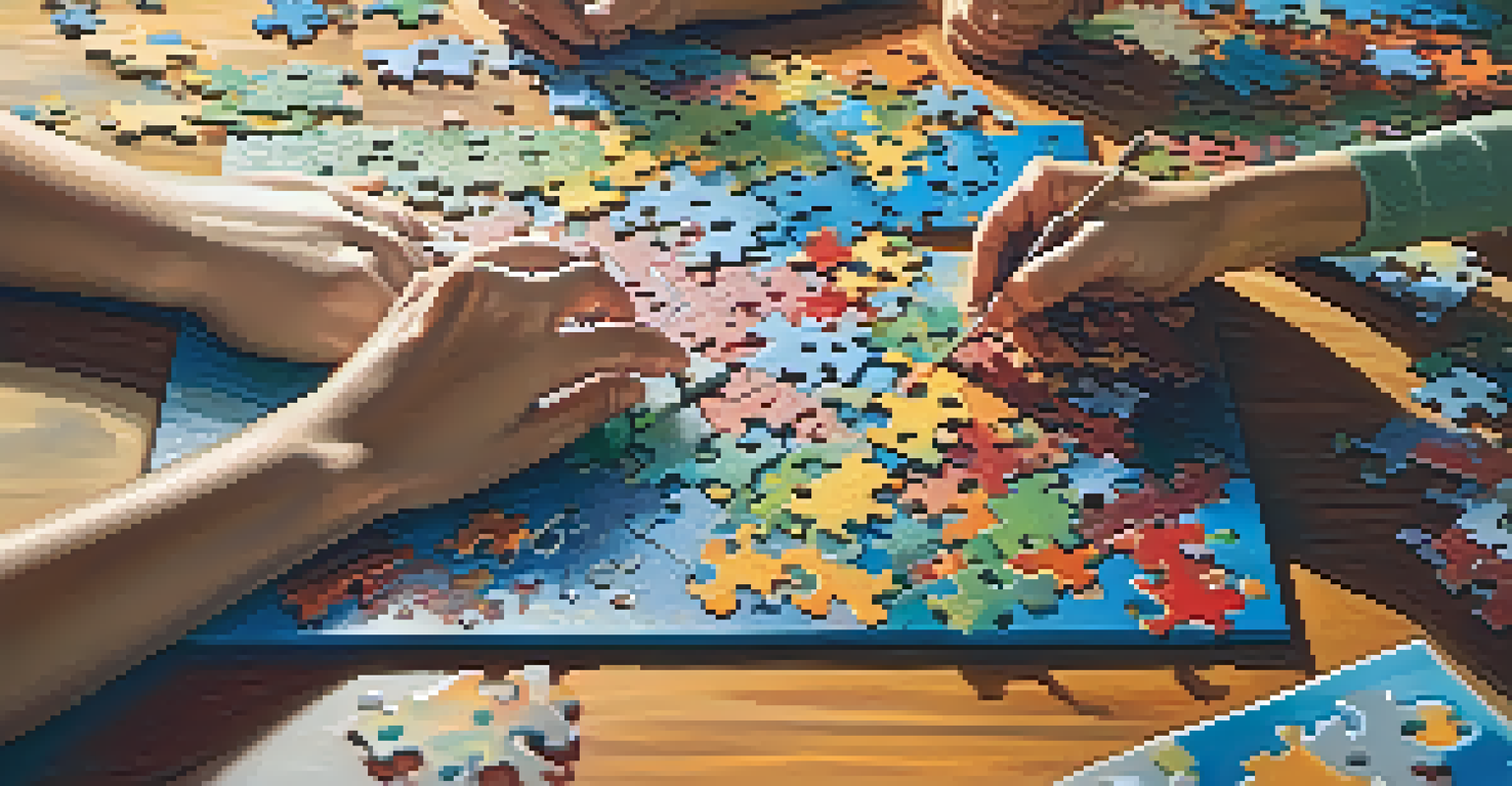The Role of Puzzles in Reducing Stress and Anxiety

Understanding Stress and Anxiety in Our Lives
In today's fast-paced world, stress and anxiety are common companions for many. They can arise from various sources, including work pressures, personal relationships, or even global events. Understanding these feelings is the first step toward managing them effectively.
It's not stress that kills us, it is our reaction to it.
Stress triggers our body's fight-or-flight response, while anxiety often leads to persistent worry and unease. Both can impact our mental health and overall well-being, making it essential to find healthy coping mechanisms. This is where engaging activities, like puzzles, come into play.
Puzzles offer a unique way to redirect our focus, pulling us away from stressful thoughts. Instead of dwelling on our worries, we can immerse ourselves in problem-solving, creating a sense of accomplishment and relief.
How Puzzles Engage the Mind and Foster Focus
When we sit down with a puzzle, whether it's a jigsaw or Sudoku, our brain enters a state of focused engagement. This concentration helps to block out distractions and worries, allowing us to immerse ourselves in a different reality. It's almost like a mini-vacation for our minds!

The act of piecing together a puzzle requires us to think critically and creatively. This mental engagement not only keeps our minds sharp but also promotes a sense of flow, where we are so absorbed in the activity that we lose track of time. This state of flow can be incredibly soothing.
Puzzles Alleviate Stress and Anxiety
Engaging in puzzles helps redirect focus and provides a sense of accomplishment, effectively reducing stress and anxiety.
Moreover, as we tackle each piece or number, we experience small victories. These wins can boost our mood and self-esteem, providing a counterbalance to the stressors in our lives. It's a simple yet powerful way to reclaim our mental space.
The Therapeutic Benefits of Solving Puzzles
Many therapists and mental health professionals recognize the therapeutic benefits of puzzles. They can serve as a tool for mindfulness, helping us to stay present in the moment. By focusing on the task at hand, we can reduce racing thoughts and find a sense of calm.
Puzzles are a great way to relax and recharge the mind, providing a sense of accomplishment and calm.
Engaging with puzzles can also promote relaxation. The repetitive nature of piecing together shapes or numbers can be akin to meditation, allowing our minds to quiet down. This form of active relaxation can be particularly beneficial after a long day.
Furthermore, puzzles can help improve our problem-solving skills, which can be applied to real-life challenges. This not only enhances our cognitive abilities but also prepares us to face stressors with a more resilient mindset.
Social Interaction: Puzzles as a Group Activity
Puzzles don't have to be a solitary activity; they can also foster social connections. Working on a puzzle with friends or family can create a bonding experience, allowing us to share laughter and moments of triumph together. This social interaction can significantly lighten our mood.
Engaging in a group puzzle activity encourages communication and teamwork. As we collaborate to fit pieces together, we cultivate a sense of belonging and support, which are essential for mental health. These shared experiences can draw us away from feelings of isolation.
Puzzles Foster Mindfulness and Relaxation
The repetitive nature of solving puzzles promotes mindfulness, allowing for relaxation and a quieter mind.
Additionally, this collective focus on a shared goal can distract us from stress and provide a welcoming space for conversations about our feelings. The combination of fun and social interaction can help alleviate the burdens of anxiety.
Finding the Right Puzzles for Stress Relief
Not all puzzles are created equal when it comes to reducing stress. It's important to find puzzles that suit your interests and skill level. Some might prefer the challenge of complex jigsaws, while others find joy in crosswords or logic puzzles.
Choosing puzzles that are enjoyable and engaging can enhance the therapeutic experience. The key is to select something that piques your curiosity and holds your attention. This way, you are more likely to stick with it and reap the stress-relief benefits.
Experimenting with different types of puzzles can help you discover what works best for you. Whether it’s a quick brain teaser or a more extensive project, finding your puzzle niche can lead to a satisfying and relaxing experience.
Incorporating Puzzles into Your Daily Routine
Integrating puzzles into your daily routine can be a game-changer for managing stress. Setting aside just 15-30 minutes a day for puzzle time can create a peaceful ritual. This consistent practice allows you to unwind and recharge amidst a busy schedule.
Consider keeping a puzzle app on your phone or a physical puzzle in your living room to encourage spontaneous engagement. This accessibility makes it easier to turn to puzzles when you need a mental break or a distraction from daily worries.
Social Puzzles Enhance Connections
Working on puzzles with others fosters social interaction, creating bonding experiences that can alleviate feelings of isolation.
By making puzzles a regular part of your life, you create a go-to strategy for stress relief. Over time, this simple habit can significantly enhance your overall well-being and help you navigate life's ups and downs with greater ease.
The Lasting Impact of Puzzles on Mental Health
The positive effects of solving puzzles extend beyond immediate stress relief. Regular engagement with puzzles can lead to long-term benefits for mental health, including improved cognitive function and emotional resilience. This makes puzzles not just a temporary escape but a valuable tool for overall well-being.
Many individuals report feeling more balanced and less anxious after incorporating puzzles into their lives. The combination of mental stimulation and relaxation creates a powerful antidote to the pressures of modern living, contributing to a more grounded state of mind.

Ultimately, embracing puzzles as a part of your self-care routine can foster a healthier relationship with stress and anxiety. In a world that often feels overwhelming, finding joy in problem-solving can be a simple yet profound way to reclaim your peace.